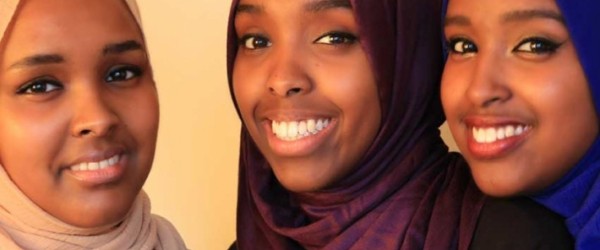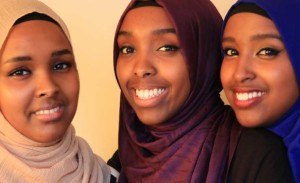The producing and dissemination of images by mainstream media has a direct impact on society. It affects the ways that we view ourselves and the way we perceive others. Television, film, advertising, and even education all play a role in spreading specific versions of reality. Communities who experience state-violence, police brutality, and increased rates of criminality, poverty and mental health, become hyper-visible when their existence is seen to be an offence to those who have been afforded cultural and political protections. Muslim communities have an intimate knowledge of how media has a direct effect on the ability to move and navigate day-to-day interactions.
In this context, it is all the more important to create our own narratives, where we are in control of the messages and portrayals of our experience and lives. The task of counter-acting and reinstating the dignity of Muslim lives has been taken up by three Somali-Canadian sisters, Hodan (25 years-old), Ayan (23 years-old) and Ilhan (21 years-old) Ibrahim of Qurtaba Publishing House. The Ibrahim sisters, currently based in Canada, are actively shining a light on topics that often times are avoided and are authentically bringing forward their identities as Black, Muslim women to their work. It is without question that the purpose and mission of QPH is necessary in the need to provide a platform for the voices of Muslim women to utilize their voices.
Since its launch in July 2015, Qurtaba Publishing House (QPH) has received significant media and community attention. The publishing house states “we want to define our narrative, our stories, our perspectives, and reclaim the voice of Muslims” a response to the burden of Muslims needing to defend “a narrative that is not ours,” remarked Hodan.
I had the opportunity to speak with the three sisters over Skype.
Hodan Ibrahim, entrepreneur and co-owner of Qurtaba, stated that QPH began as response to a lack of relevant information within the English-speaking community for the contemporary Muslim. Her first significant ‘aha’ moment happened when she was unable to find any resources on entrepreneurship in Islam at Reviving the Islamic Spirit conference, held annually in Toronto, Canada.
“I went to every single bookshop […] I felt like all the books were direct Arabic to English translation on classical Islamic texts, or people were just reselling popular books. But I was like where are the books on anti-racism in Islam, or books on, you know, how to mediate intergenerational conflict?”
Inspired by the Spanish city of Cordoba, where the Islamic Enlightenment flourished in the 10th century, the sisters aim to foster pluralist conversations amongst and between various Muslim communities.
Thus far the sisters have self-published six books, ranging in topics of how to be a Muslim woman entrepreneur, finding one’s purpose, mitigating conflict with immigrant parents and raising health consciousness. Ayan Ibrahim, a registered nurse practitioner, shared her motivation for writing The Health Conscious Muslim:
“Coming out of nursing school, you learn that Western medicine is the answer […] that’s why they call it alternative medicine, it’s something to consider after using conventional medicine.”
The topic of Muslim women and entrepreneurship can be traced back to the very beginnings of Muslim history with the prophet’s first wife and confidant, Khadija. A successful businesswoman who hired the Prophet and asked for his hand in marriage, Khadija is a prime example of empowered Muslim women.
Hodan had this to say of her desire to share entrepreneurial knowledge with Muslim women:
“there is so much that we can extract form the life of Khadija and I think people hold her as a beacon, but in a lot of ways I guess, the idea of Khadija is really intimidating. So I just kind of wanted to show women that there is a piece of Khadija that they can embrace inside of themselves, which is that of a powerful kind of entrepreneurial woman who can make decision for herself.”
Of course the sisters’ work has also garnered attention from men who are opposed to women carving spaces out specifically for their narratives and stories to be told. “We grew up with a single mother who had to be mother and father, a woman who struggled so much just for us to have what have to today. So we saw what a strong woman can be like, and learn that it came to us,” said Ayan in response to the critical comments made by men in the community.
The sisters have managed to bring their full selves to the project and encourage others to do the same. As Black Muslim women whose lives are impacted by anti-black racism, Islamophobia, and sexism, they are committed to creating images that move away from defeatist mentalities that trap Muslim peoples in having to defending their goodness, instead of freedom of expression that promotes community and individual self-esteem.
Hodan explains:
“Countering Islamophobia […] the inferiority complex. If we can deconstruct the inferiority complex of what we are facing […] people feel that we are not contributing as a people, and they see us as burdens. A large part of the defeatist mentality is largely part to not knowing the contribution that their people, their heritage have made. This can make sense to Black people, any indigenous community, or any community of colour, I guess. But the Muslim community specifically if we were to look at the attacks that is fuelling anti-Muslim sentiment, it comes from a lack of respect for what we are actually giving to the world. They see us as being a burden, they see us as people causing harm…and this is in Muslims as well, we don’t understand what our contributions are.”
She continues:
“[It is important] for our own psyche and our own psychology as Muslims, to open up the door of conversation and dialogue to other communities, to realize that we have had a huge impact on civilization, whether we are African Muslims, or Muslims from the Indian subcontinent, or Muslims from South-East Asia, and we continue to make these contributions.”
Qurtaba Publishing House aims to engage in a multi-faceted conversation calling in communities to share perspectives to increase understanding and acceptance of difference.
In speaking about their vision for the next 2-5 years, the sisters intend to become the largest Islamic publisher of relevance of content production for Muslim English-speaking communities. Their commitment to producing high-quality content in addition to facilitating workshops that communities can actively partake in the conversation will heighten local and global engagement.
Unlike other publishing houses that create unequal profit margins for writers, Qurtaba follows the principles of Islamic entrepreneurship, thus there is an equal share in risks for both publisher and writer.
For more information on Qurtaba, visit their website.
Our interview ended with me asking some fun questions! Check out what the sisters of Qurtaba Publishing House had to say.
MMW: What are y’all reading now?
Hodan: I’m reading “Wretched of the Earth” by Franz Fanon
Ayan: “Zahir” by Paulo Coelho
Ilhan: “Signs of the Horizon” by Michael Sugich
MMW: What would you say to a young Muslim woman who wants to follow her dream in two words?
Ilhan: DO it!
Ayan: Be Fearless!
Hodan: “Persistence wins”
MMW: For you what does it mean to live on purpose?
Ilhan: “When I wake up every morning I know I’m not only helping myself, but other people around me and leaving a legacy for people who need it most.
Ayan: I think it’s living God’s will on Earth. It’s about knowing we are vessels in which, through us we do the work of God. But it’s living with intent in your life and living through the good will and helping others, and helping yourself as well. It’s about doing what’s good and being truthful and standing with justice.
Hodan: For me its being intentional and to live within your truth. That’s what it means.”





